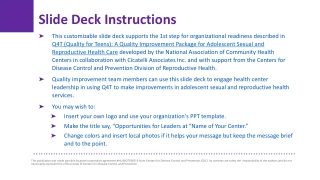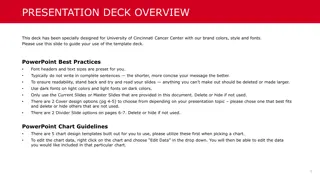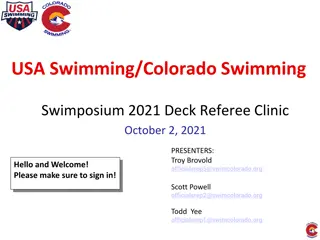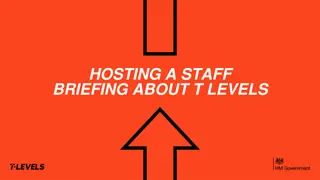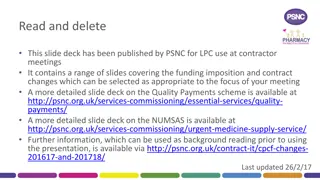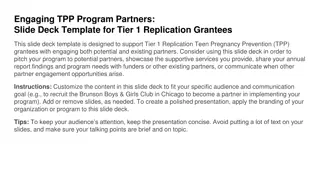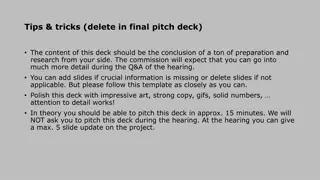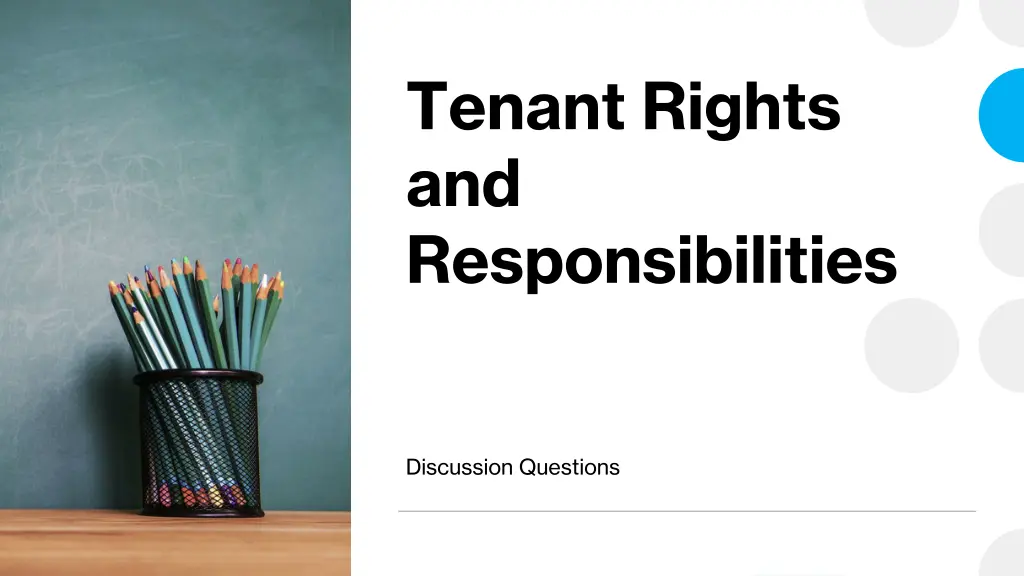
Tenant Rights and Responsibilities Discussion
Explore essential tenant responsibilities and rights through insightful questions covering topics such as property maintenance, personal projects, pest control, illegal activities, repairs, and safety equipment. Understand the crucial aspects of being a responsible tenant within a rental property.
Download Presentation

Please find below an Image/Link to download the presentation.
The content on the website is provided AS IS for your information and personal use only. It may not be sold, licensed, or shared on other websites without obtaining consent from the author. If you encounter any issues during the download, it is possible that the publisher has removed the file from their server.
You are allowed to download the files provided on this website for personal or commercial use, subject to the condition that they are used lawfully. All files are the property of their respective owners.
The content on the website is provided AS IS for your information and personal use only. It may not be sold, licensed, or shared on other websites without obtaining consent from the author.
E N D
Presentation Transcript
Tenant Rights and Responsibilities Discussion Questions
What is the most important responsibility of a tenant? A: Paying the rent
How clean does your place have to be? Can the landlord inspect your place and ask you to clean it? A: The landlord can do regular inspections. They can ask you to clean your house if it s a health and safety hazard.
Which of these can you do in your rental or on the property? Paint your bedroom Have a yard sale Change the oil in your car Hang heavy pictures on the walls A: The landlord can limit or prohibit each of these and more. The lease should state all the things you can and can t do in the rental. It s a good idea to get permission before doing personal projects on the common property.
You have insects in your place. What do you do and who pays for it? A: If you brought them in, you are responsible for them. The unit should be free of critters when you move in.
Your relative, who is temporarily staying with you, is using your home and your place to arrange drug deals. Are you responsible in any way? A: You are responsible to make sure that there is no illegal activity going on in the place you rent.
Which of these repairs are you responsible for? A window breaks due to an indoor football game. A bird flies into your glass screen door and cracks it. You trip on the stairs, fall against the railing, and break it. A: Damages you cause are your responsibility to repair with the landlord s approval. YES-indoor football game PROBABLY NOT-Bird v. glass MAYBE-Railing on the stairs could be the landlord s responsibility if the railing is not to code or needs repairs in the first place
What happens if you dont keep the smoke/CO2 detector connected and in working order? A: The landlord is responsible for providing a working smoke/CO2 detector. The tenants are responsible for keeping them in working order. If there is a fire or incident, the tenant can be responsible for damages and can also be levied a fine from the fire department.
Which of these can the landlord tell you to do? Get renters insurance Don t put political posters in the window Park in a certain place No smoking of any kind on the property, including medical marijuana A: The landlord can do all of these. It is becoming more common for a landlord to require renter s insurance. Landlords can prohibit smoking of any kind on the property, even medical marijuana since it is not legal on a federal level. Whatever the rule is, the landlord must enforce it consistently with all tenants.
Which appliances can the tenants expect to have when they move into an apartment or house? Who is responsible for their repair? A: By law, the landlord must only supply appliances that provide hot and cold running water, electrical, and plumbing. However, the appliances that are in the rental when tenants agree to lease are the ones that they can reasonably assume will be there for their use. The landlord is responsible for their repair and replacement.
True or False? The landlord doesn t have to give you 24/7 contact information if they live out of state The landlord doesn t have to give you a receipt for payments The landlord should replace batteries in the smoke detector A: FALSE. Even if the landlord lives far away, they must provide a 24/7 emergency contact. FALSE. The landlord is required to give a receipt for both the deposit, and any cash payments, the landlord does not have to give receipts for debit/credit card payments unless the tenant asks for them. FALSE. Although many landlords do change the batteries, it s legally the responsibility of the tenants.
How long does the landlord have to fix things that are broken? A: There are time limits when the landlord must address the problem (not necessarily fix it.) 24 hours for no electricity; no hot or cold water. 72 hours for appliances and plumbing. 10 days for everything else.
What do you do if the landlord doesn t make repairs? A: If the landlord doesn t make repairs, contact Washington Law Help (www.washingtonlawhelp.org) No matter what, you must pay your rent.
The Condition report/checklist Does the landlord have to do one? Can the landlord give it to you to fill out and return? What happens if you find something wrong after you sign the report? A: Landlords must do a condition report/checklist if they charge a deposit. However, they do not have to do an exit report, but it s a good idea to ask for one so that you know if you re getting your deposit back. The landlord should do the condition report with you. Take pictures or a video. The pictures and video cannot take the place of a written report. If you move in and find something wrong, you have 7 days to make changes to the condition report. Contact your landlord in writing.
How much notice must a landlord give you before coming into your place? When can a landlord just walk in? A:The landlord must give 48 hours written notice before entering the premises; 24 hours written notice if the place is for sale and is being shown. If there s an emergency, the landlord doesn t need to give notice. If you request repairs, the landlord doesn t have to give you notice before entering to make the repairs.
What do you do if you have a problem landlord? A: Be the best tenant possible, ensuring that you pay your rent on time, and attempt to communicate your needs clearly. Document everything! Write it down, keep a record. Take pictures of things that need repair, write down and track phone conversations and other forms of communication with the landlord. Bring a friend who does not live with you as a witness.
Which of the following can a landlord do? Charge a deposit or fee for a comfort/therapy animal Make you pay for a ramp up the steps for your walker Refuse to let you have an unusual assistance animal like an iguana or boa constrictor A: According to Fair Housing laws, any animal can be a therapy/comfort animal and the landlord must allow that animal into housing when the tenant has a letter of verification from a medical professional. The tenant cannot be charged a deposit fee, or extra rent for having that animal. The tenant can be asked to pay for the modifications to the structure. ANY animal can be a therapy/comfort animal in housing. NOTE: The American Disabilities Act, which covers service animals outside of housing has different rules.
Which three types of crimes can a landlord legally deny a renter? Arson Drug manufacturing Sex Crimes
Do you have an eviction on your record if You receive a 14 day pay or vacate notice? You move out the day after receiving a pay or vacate notice? You go to court and win your case against the landlord who refused to accept your rent? A: NO. The first 14 day pay or vacate notice is only the landlord s intent to evict. NO. If you move out within the 14 days, you do not have an eviction on your record because the landlord must file the eviction in court. They can t evict you from a place that you ve already left. However, they can take you to court for the money that you owe the landlord. NO. You do not have an eviction on your record. However, the record will show that you went to eviction court and it s up to you to show the results of that hearing.
Evictions: Can the landlord evict you if you are always late with your rent? What happens if you don t show up for eviction court? If you are evicted, does the landlord have to keep your stuff for you? How do you get an eviction off your record? A: YES. If you receive more that 3 eviction notices in a year, you can be evicted (Even if you paid the rent within the stated time.) The landlord gets whatever they ask for if you aren t there to defend yourself in court. The landlord does not have to keep your stuff. However, in the writ of restitution served by the sheriff has a form on the back where you can request that the landlord move and store your stuff up to 30 days. You pay for the moving and storing. Some people can get and Order of Limited Dissemination which is a court order signed by a judge that limits the use of an eviction record.

